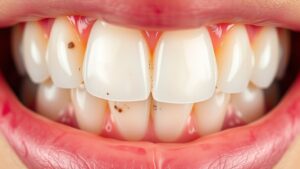Envision spotting a tiny black dot on your teeth and questioning whether it’s a sign of trouble. Non-cavity black spots can be perplexing, but they often stem from harmless surface stains rather than decay. Whether it’s your morning coffee or those beloved berry smoothies, everyday foods can take a toll on your smile. Intrigued about the causes behind these spots and how to tackle them? Let’s analyze everything you need to know.
Non-Cavity Black Spots on Teeth
As you observe those pesky black spots on your teeth, you could contemplate whether they’re the indicator of something serious—like a cavity.
Fortunately, non-cavity black spots usually arise from external factors, such as food staining, tartar buildup, or tobacco use. Unlike cavities, which often feel rough, these spots are smooth to the touch, indicating they’re more related to discoloration. Foods like coffee, red wine, and blueberries can contribute to these stains.
To keep your teeth looking their best, maintaining good oral hygiene is essential—brushing, flossing, and visiting your dentist for professional cleanings can greatly reduce their occurrence.
Don’t forget, treatments are available, and your dental health is in your hands!
Common Causes of Black Spots on Teeth
Black spots on your teeth can be more than just an eyesore; they often result from several common causes that are worth grasping. Recognizing these causes can help you take action and keep your smile healthy.
- Dietary factors: Foods like coffee, red wine, and berries can stain your enamel.
- Tobacco products: Smoking contributes considerably to black discoloration over time.
- Plaque and tartar: Buildup can create dark spots, often near the gumline, needing dental cleaning.
- Intrinsic discoloration: Conditions like Celiac disease can cause permanent black spots.
If you’re worried about those pesky spots, consulting with dental professionals can help you identify the cause and find the best treatment options.
How to Differentiate Between Black Spots and Cavities
In case you spot a black mark on your tooth, it can be a bit nerve-wracking, and understanding how to determine whether it’s a cavity or just a stain is crucial.
Look for signs like roughness or sensitivity—those usually point to cavities, while smooth spots often indicate something less serious.
Regular dental visits also play a big role in getting an accurate diagnosis, so don’t skip out on those check-ups!
Signs of Cavities
Have you ever questioned how to tell the difference between those perplexing black spots on your teeth and actual cavities? Comprehending the signs of a cavity can assist you in protecting your dental health:
- Tooth pain, especially while biting down
- Sensitivity to hot or cold foods
- Visible holes or pits in your teeth
- Rough or soft texture to the touch
In contrast, non-cavity black spots often feel smooth and mightn’t cause any discomfort.
These black spots usually result from staining, not tooth decay. Regular dental check-ups are essential for accurate diagnosis, allowing for timely professional dental cleanings and proper restorative treatment should it be necessary.
Keep an eye on your oral health, and reach out to your dentist should you notice any concerning changes!
Characteristics of Stains
Identifying the nature of the black spots on your teeth can feel overwhelming, especially at the time you want to take charge of your dental health.
To distinguish between black spots and cavities, you can start by feeling the surface of the spots. Black spots are usually smooth, while cavities are rough or soft, often with pits.
These black spots are often just surface stains caused by foods or beverages, in contrast to cavities, which result from bacteria attacking your tooth enamel.
Regular dental cleanings are key, as dental professionals can help assess these spots accurately.
Should you be concerned about discoloration, they may suggest whitening procedures to improve your smile.
Taking these steps will keep your dental health on track!
Importance of Diagnosis
Differentiating between black spots and cavities is vital for maintaining your dental health and peace of mind. You want to make sure those dark patches aren’t concealing decay. Here’s how to recognize the difference:
- Cavities are rough or soft; black spots are smooth.
- A finger test can help: irregular spots suggest cavities, while smooth spots usually indicate staining.
- Dental professionals use visual examinations to assess discoloration, texture, and location.
- X-rays can reveal concealed issues not visible externally.
Regular dental check-ups are essential. They give you the chance to accurately evaluate any spots and discuss treatment options.
Don’t hesitate to consult with professionals; they can ease your concerns and guide you on the best path forward!
Treatment Options for Non-Cavity Black Spots
While black spots on your teeth can be concerning, realizing that effective treatment options are available can offer some peace of mind. A professional dentist can create a personalized treatment plan to address your specific needs.
For starters, professional cleaning can remove tartar buildup, restoring your teeth’s natural look. Teeth whitening treatments—whether in-office or at-home—can greatly lighten surface stains.
Should deeper stains persist, dental bonding uses tooth-colored resin to provide an aesthetic solution. For a longer-lasting fix, consider porcelain veneers to conceal intrinsic discoloration.
Keep in mind, regular dental checkups guarantee effective management and help prevent future issues.
With proper dental care, you’ll maintain a bright, healthy smile that enhances your confidence.
Preventing the Formation of Black Spots on Teeth
You can keep your smile bright and healthy through following a few simple steps.
Start through sticking to a solid oral hygiene routine, and don’t forget to watch what you eat and drink.
Regular dental check-ups also play a vital role in preventing those pesky black spots from forming on your teeth.
Good Oral Hygiene Practices
Upon the occasion of keeping your smile bright and healthy, establishing a solid oral hygiene routine can make all the difference. Through brushing and flossing regularly, you help combat plaque buildup, which leads to black spots.
Regular dental check-ups are essential too, as professional cleanings can eliminate tartar and surface stains. Plus, using whitening toothpaste can assist in plaque removal and improve your smile’s brightness.
To effectively reduce your risk of discoloration, consider these practices:
- Brush twice a day with fluoride toothpaste.
- Floss daily to clear hard-to-reach areas.
- Schedule professional cleanings every six months.
- Limit staining foods and beverages like coffee or red wine.
Dietary Adjustments for Prevention
Good oral hygiene isn’t just about brushing and flossing; your diet plays a big role too.
To prevent black spots on your teeth, try making some dietary adjustments. Start with limiting staining foods and beverages like coffee, red wine, and tea. Instead, munch on crunchy fruits and vegetables like apples and carrots; they help scrub away stains and enhance saliva production, keeping your mouth clean.
Don’t forget to drink plenty of water, especially after indulging in staining foods, to flush out those pesky particles. Make sure your diet is rich in calcium and phosphorus for stronger enamel too.
Finally, consider using a straw for those staining drinks, and incorporate a good whitening toothpaste into your routine to keep your smile bright!
Regular Dental Check-ups
Maintaining your smile isn’t just about daily brushing; getting regular dental check-ups can make a huge difference too.
These visits help catch black spots promptly, allowing for timely treatment before they worsen. Professional cleanings remove tartar buildup, which keeps your enamel healthy and prevents discoloration. Your dentist can also spot the causes of dark spots and give you customized prevention tips.
Here are some benefits of regular dental check-ups:
- Prompt identification of black spots and other dental issues
- Removal of tartar buildup through professional cleaning
- Customized prevention strategies designed for your needs
- Thorough assessments, including X-rays, for concealed problems
When to Consult a Dental Professional
Have you ever questioned at what point it’s time to see a dentist about those mysterious black spots on your teeth? Should those spots feel smooth and don’t show any cavities like pits or holes, it’s wise to consult a dental professional. You should definitely schedule that visit in case you’re experiencing sensitivity, pain, or any changes in tooth structure. Regular dental assessments can help distinguish between harmless discoloration and more serious dental issues that could need treatment. Also, in case you’ve got a history of dental problems or notice any new changes, don’t wait—getting checked out promptly is key!
| Signs to Consult Your Dentist | Reason for Consultation |
|---|---|
| Black spots with sensitivity | Potential fundamental issues |
| Changes in tooth structure | Risk of more serious conditions |
| Accompanying pain | Need for immediate treatment |
| History of dental issues | Prevention of future complications |
| Regular check-ups needed | Monitoring tooth health effectively |





